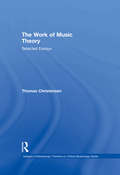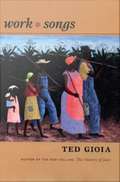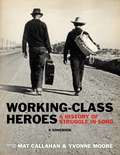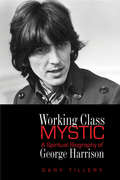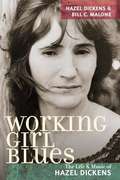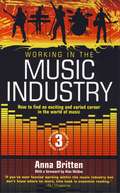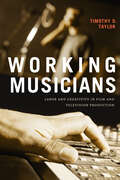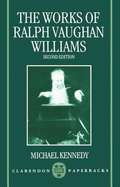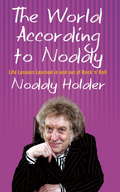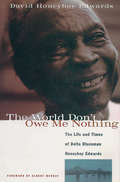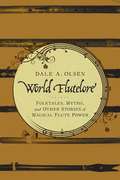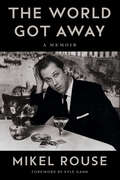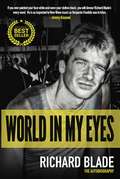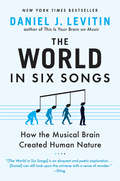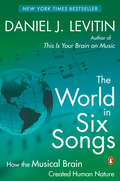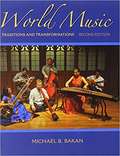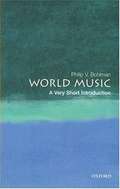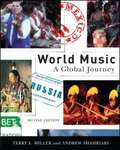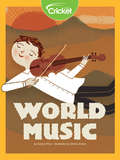- Table View
- List View
The Work of Music Theory: Selected Essays (Ashgate Contemporary Thinkers On Critical Musicology Ser.)
by Thomas ChristensenThis collection brings together an anthology of articles by Thomas Christensen, one of the leading historians of music theory active today. Published over the span of the past 25 years, the selected articles provide a historical conspectus about a range of vital topics in the history of music theory, focusing in particular upon writings from the seventeenth and eighteenth centuries. Christensen examines a variety of theorists and their arguments within the intellectual and musical contexts of their time, in the process highlighting the diverse and idiosyncratic nature of the discipline of music theory itself. In the first section of the book Christensen offers general reflections on the meaning and interpretation of historical music theories, with especial attention paid to their value for music theorists today. The second section of the book contains a number of articles that consider the catalytic role of the thorough bass in the development of harmonic theory during the seventeenth and eighteenth centuries. In the final two sections of the anthology, focus turns to the writings of several individual music theorists, including Marin Mersenne, Seth Calvisius, Johann Mattheson, Johann Nicolaus Bach, Denis Diderot and Johann Nichelmann. The volume includes essays from hard-to-find publications as well as newly-translated material and the articles are prefaced by a new, wide-ranging autobiographical essay by the author that offers a broad re-assessment of his historical project. This book is essential reading for music theorists and seventeenth- and eighteenth-century musicologists.
Work Songs
by Ted GioiaAll societies have relied on music to transform the experience of work. Song accompanied the farmer's labors, calmed the herder's flock, and set in motion the spinner's wheel. Today this tradition continues. Music blares on the shop floor; song accompanies transactions in the retail store; the radio keeps the trucker going on the long-distance haul. Now Ted Gioia, author of several acclaimed books on the history of jazz, tells the story of work songs from prehistoric times to the present. Vocation by vocation, Gioia focuses attention on the rhythms and melodies that have attended tasks such as the cultivation of crops, the raising and lowering of sails, the swinging of hammers, the felling of trees. In an engaging, conversational writing style, he synthesizes a breathtaking amount of material, not only from songbooks and recordings but also from travel literature, historical accounts, slave narratives, folklore, labor union writings, and more. He draws on all of these to describe how workers in societies around the world have used music to increase efficiency, measure time, relay commands, maintain focus, and alleviate drudgery. At the same time, Gioia emphasizes how work songs often soar beyond utilitarian functions. The heart-wringing laments of the prison chain gang, the sailor's shanties, the lumberjack's ballads, the field hollers and corn-shucking songs of the American South, the pearl-diving songs of the Persian Gulf, the rich mbube a cappella singing of South African miners: Who can listen to these and other songs borne of toil and hard labor without feeling their sweep and power? Ultimately, Work Songs, like its companion volume Healing Songs, is an impassioned tribute to the extraordinary capacity of music to enter into day-to-day lives, to address humanity's deepest concerns and most heartfelt needs.
Working-Class Heroes: A History of Struggle in Song: A Songbook
by Mat CallahanWorking-Class Heroes is an organic melding of history, music, and politics that demonstrates with colorful evidence that workers everywhere will struggle to improve their conditions of life. And among them will be workers who share an insight: in order to better our lot, we must act collectively to change the world. This profusely illustrated treasury of song sheets, lyrics, photographs, histories, and biographical sketches explores the notion that our best hope lies in the capacity of ordinary working people to emancipate ourselves and all of humanity. Featuring more than a dozen songwriters, from Joe Hill to Aunt Molly Jackson, Working-Class Heroes delivers a lyrical deathblow to the myth that so-called political songs of the 20th century were being written by intellectuals in New York. The songs collected here have a striking relevance to current affairs and invite us to explore the historical conditions that inspired their creation: systemic crisis, advancing fascism, and the threat of world war. These working-class songwriters showed courage and heroism that is immortal, and such heroes and their work should be celebrated still today. The heroes featured in this collection include Sarah Ogan Gunning, Ralph Chaplin, Woody Guthrie, Ella May Wiggins, Joe Hill, Paul Robeson, John Handcox, Aunt Molly Jackson, Jim Garland, Alfred Hayes, and Joseph Brandon.
Working Class Mystic
by Gary TilleryJohn Lennon called himself a working class hero. George Harrison was a working class mystic. Born in Liverpool as the son of a bus conductor and a shop assistant, for the first six years of his life he lived in a house with no indoor bathroom. This book gives an honest, in-depth view of his personal journey from his blue-collar childhood to his role as a world-famous spiritual icon.Author Gary Tillery's approach is warmly human, free of the fawning but insolent tone of most rock biographers. He frankly discusses the role of drugs in leading Harrison to mystical insight but emphasizes that he soon renounced psychedelics as a means to the spiritual path. It was with conscious commitment that Harrison journeyed to India, studied sitar with Ravi Shankar, practiced yoga, learned meditation from the Maharishi Mahesh Yogi, and became a devotee of Hinduism. George worked hard to subdue his own ego and to understand the truth beyond appearances. He preferred to keep a low profile, but his empathy for suffering people led him to spearhead the first rock-and-roll super event for charity. And despite his wealth and fame, he was always delighted to slip on overalls and join in manual labor on his grounds. At ease with holy men discussing the Upanishads and the Bhagavad Gita, he was ever the bloke from Liverpool whose father drove a bus, whose brothers were tradesmen, and who had worked himself as an apprentice electrician until the day destiny called.Tillery's engaging narrative depicts Harrison as a sincere seeker who acted out of genuine care for humanity and used his celebrity to be of service in the world. Fans of all generations will treasure this book for the inspiring portrayal it gives of their beloved "quiet" Beatle.
Working Class Mystic
by Gary TilleryJohn Lennon called himself a working class hero. George Harrison was a working class mystic. Born in Liverpool as the son of a bus conductor and a shop assistant, for the first six years of his life he lived in a house with no indoor bathroom. This book gives an honest, in-depth view of his personal journey from his blue-collar childhood to his role as a world-famous spiritual icon.Author Gary Tillery's approach is warmly human, free of the fawning but insolent tone of most rock biographers. He frankly discusses the role of drugs in leading Harrison to mystical insight but emphasizes that he soon renounced psychedelics as a means to the spiritual path. It was with conscious commitment that Harrison journeyed to India, studied sitar with Ravi Shankar, practiced yoga, learned meditation from the Maharishi Mahesh Yogi, and became a devotee of Hinduism. George worked hard to subdue his own ego and to understand the truth beyond appearances. He preferred to keep a low profile, but his empathy for suffering people led him to spearhead the first rock-and-roll super event for charity. And despite his wealth and fame, he was always delighted to slip on overalls and join in manual labor on his grounds. At ease with holy men discussing the Upanishads and the Bhagavad Gita, he was ever the bloke from Liverpool whose father drove a bus, whose brothers were tradesmen, and who had worked himself as an apprentice electrician until the day destiny called. Tillery's engaging narrative depicts Harrison as a sincere seeker who acted out of genuine care for humanity and used his celebrity to be of service in the world. Fans of all generations will treasure this book for the inspiring portrayal it gives of their beloved "quiet" Beatle.
Working Girl Blues: The Life and Music of Hazel Dickens (Music in American Life)
by Bill C Malone Hazel DickensHazel Dickens is an Appalachian singer and songwriter known for her superb musicianship, feminist country songs, union anthems, and blue-collar laments. Growing up in a West Virginia coal mining community, she drew on the mountain music and repertoire of her family and neighbors when establishing her own vibrant and powerful vocal style that is a trademark in old-time, bluegrass, and traditional country circles. Working Girl Blues presents forty original songs that Hazel Dickens wrote about coal mining, labor issues, personal relationships, and her life and family in Appalachia. Conveying sensitivity, determination, and feistiness, Dickens comments on each of her songs, explaining how she came to write them and what they meant and continue to mean to her. Bill C. Malone's introduction traces Dickens's life, musical career, and development as a songwriter, and the book features forty-one illustrations and a detailed discography of her commercial recordings.
Working In The Music Industry: How To Find An Exciting And Varied Career In The World Of Music
by Anna BrittenThe music industry is one of the most exciting, glamorous and fun places you could ever work in. It's also a fiercely competitive world, both for jobseekers and those already on the inside. But opportunities arise constantly, and are within the grasp of almost anyone with a true passion for music and a hard-working attitude. This book aims to help you take your first step into what will hopefully be a long and satisfying career in an endlessly fascinating world. Each chapter covers a field of work within the music industry - from record companies to recording studios to roadies - and is crammed with honest, realistic, practical and helpful advice. Insider secrets and individual case studies throw even more light on the subject.Contents: Acknowledgements; Foreword by Alan McGee; Preface; 1. An overview of the Music Industry; 2. Getting a Job; 3. Record Companies; 4. Music Publishing; 5. Music PR and Plugging; 6. Artist Managers; 7. Live Music: Booking Agents, Concert Promoters, Tour Managers and Roadies; 8. Music Journalism; 9. Recording Studios: Record Producers, Sound Engineers and Studio Managers; 10. Music Retail; Glossary; Useful Addresses; Further Reading; Index.
Working In The Music Industry: How To Find An Exciting And Varied Career In The World Of Music
by Anna BrittenThe music industry is one of the most exciting, glamorous and fun places you could ever work in. It's also a fiercely competitive world, both for jobseekers and those already on the inside. But opportunities arise constantly, and are within the grasp of almost anyone with a true passion for music and a hard-working attitude. This book aims to help you take your first step into what will hopefully be a long and satisfying career in an endlessly fascinating world. Each chapter covers a field of work within the music industry - from record companies to recording studios to roadies - and is crammed with honest, realistic, practical and helpful advice. Insider secrets and individual case studies throw even more light on the subject.Contents: Acknowledgements; Foreword by Alan McGee; Preface; 1. An overview of the Music Industry; 2. Getting a Job; 3. Record Companies; 4. Music Publishing; 5. Music PR and Plugging; 6. Artist Managers; 7. Live Music: Booking Agents, Concert Promoters, Tour Managers and Roadies; 8. Music Journalism; 9. Recording Studios: Record Producers, Sound Engineers and Studio Managers; 10. Music Retail; Glossary; Useful Addresses; Further Reading; Index.
Working Musicians: Labor and Creativity in Film and Television Production
by Timothy D. TaylorIn Working Musicians Timothy D. Taylor offers a behind-the-scenes look at the labor of the mostly unknown composers, music editors, orchestrators, recording engineers, and other workers involved in producing music for films, television, and video games. Drawing on dozens of interviews with music workers in Los Angeles, Taylor explores the nature of their work and how they understand their roles in the entertainment business. Taylor traces how these cultural laborers have adapted to and cope with the conditions of neoliberalism as, over the last decade, their working conditions have become increasingly precarious. Digital technologies have accelerated production timelines and changed how content is delivered, while new pay schemes have emerged that have transformed composers from artists into managers and paymasters. Taylor demonstrates that as bureaucratization and commercialization affect every aspect of media, the composers, musicians, music editors, engineers, and others whose soundtracks excite, inspire, and touch millions face the same structural economic challenges that have transformed American society, concentrating wealth and power in fewer and fewer hands.
Works for Piano Four Hands and Two Pianos (Dover Music For Piano Ser.)
by Wolfgang Amadeus MozartFrom his earliest years. Mozart played piano duets with his sister, and as his musical career progressed he created a small repertoire of masterly four-hand piano compositions that are among the most admired and performed in this distinctive genre.This Dover edition presents six of these choice works, plus two compositions Mozart wrote for two pianos all reprinted from the authoritative Breitkopf & Härtel edition: Sonatas in D Major (K.381/123a), B-flat Major (K.358/186c), F Major (K.497), G Major (K.497a and 500a), and C Major (K.521) and Theme and Variations in G Major (K.501). Also for 2 pianos: Sonata in D Major (K.448/375a) and Fugue in C Minor (K.426). Duet enthusiasts will discover in these charming works the sparkling elegance, varied moods, and fluid textures that constitute the very essence of Mozart's musical personality.
The Works of Ralph Vaughan Williams
by Michael KennedyThis is the authoritative account of Vaughan Williams's musical life - the story of a great composer's career, and at the same time the story of music in England over half a century and more. Kennedy considers the principal works in chronological order, outlining the main features of each and discussing details of the music's structure, often illuminating his point with a musical quotation. He also provides a good deal of biographical data, and so builds up a picture of the composer, as well as providing thumbnail sketches of many of Vaughan Williams's friends and colleagues. Kennedy's extensive knowledge of Vaughan Williams's output also enables him to refer back and forth across the works to pick out lines of development and influence. The book includes a full classified list of Vaughan Williams's works. Michael Kennedy has provided a new preface.
The World According To Noddy: Life Lessons Learned In and Out of Rock & Roll
by Noddy HolderWhat makes Noddy Holder tick? Godfather of glam, national treasure and thinking grandmother’s crumpet, Noddy has been at the epicentre of British pop culture since he stormed on to the music scene in the 1960s, and in The World According to Noddy he gives us a hilarious window on to his extraordinary life. Told in his own inimitable style, Noddy shares insider accounts of his days on the road, along with a healthy dose of celebrity gossip, and leaves no stone unturned as he expounds on some of his favourite subjects – fame, friendship and fatherhood, the perils of social media and the modern age, not to mention what it would be like if he ruled the world . . . From his early days on the West Midlands beat scene, including a stint as a roadie for Robert Plant, Noddy charts his rise from skinhead stomper to international pop-star, statesman, playboy, male model and philosopher, and of course one of the most integral parts of a Great British Christmas. Witty, wise and tremendously funny, this is Noddy Holder at his glittering best.
The World Don't Owe Me Nothing: The Life and Times of Delta Bluesman Honeyboy Edwards
by David Honeyboy EdwardsThis vivid oral snapshot of an America that planted the blues is full of rhythmic grace. From the son of a sharecropper to an itinerant bluesman, Honeyboy's stories of good friends Charlie Patton, Big Walter Horton, Little Walter Jacobs, and Robert Johnson are a godsend to blues fans. History buffs will marvel at his unique perspective and firsthand accounts of the 1927 Mississippi River flood, vagrancy laws, makeshift courts in the back of seed stores, plantation life, and the Depression.
World Flutelore: Folktales, Myths, and Other Stories of Magical Flute Power
by Dale A. OlsenIn many places around the world, flutes and the sounds of flutes are powerful magical forces for seduction and love, protection, vegetal and human fertility, birth and death, and other aspects of human and non-human behavior. This book explores the cultural significance of flutes, flute playing, and flute players from around the world as interpreted from folktales, myths, and other stories--in a word, "flutelore." A scholarly yet readable study, World Flutelore: Folktales, Myths, and Other Stories of Magical Flute Power draws upon a range of sources in folklore, anthropology, ethnomusicology, and literary analysis. Describing and interpreting many examples of flutes as they are found in mythology, poetry, lyrics, and other narrative and literary sources from around the world, veteran ethnomusicologist Dale Olsen seeks to determine what is singularly distinct or unique about flutes, flute playing, and flute players in a global context. He shows how and why world flutes are important for personal, communal, religious, spiritual, and secular expression and even, perhaps, existence. This is a book for students, scholars, and any reader interested in the cultural power of flutes.
The World Got Away: A Memoir (Music in American Life)
by Mikel RouseOne of the most innovative composers of his generation, Mikel Rouse is known for a trilogy of operas that includes Dennis Cleveland and a gift for superimposing pop vernaculars onto avant-garde music. This memoir channels Rouse’s high energy personality into an exuberant account of the precarity and pleasures of artistic creation. Raconteur and starving artist, witty observer and acclaimed musician, Rouse emerged from the legendary art world of 1980s New York to build a forty-year career defined by stage and musical successes, inexhaustible creativity, and a support network of famous faces, loyal allies, and high art hustlers. Rouse guides readers through a working artists’ hardscrabble life while illuminating the unromantic truth that a project’s reception may depend on a talented cast and crew but can depend on reliable air conditioning. Candid and hilarious, The World Got Away is a one-of-a-kind account of a creative life fueled by talent, work, and luck.
World in My Eyes: The Autobiography
by Richard BladeRichard Blade&’s autobiography is much more than a spotlight on any one decade. Instead, he gives you a jaw-dropping, uncensored insider&’s look into the world of music, movies, and television and its biggest stars, starting in the sixties and continuing through to the new century. Richard takes you on a journey that few have experienced: from his early days as a student at Oxford to the wild, lascivious nights of being a disco DJ touring the clubs of Europe, to coming to America and working with Michael Jackson, Barbra Streisand, and Sarah Jessica Parker and finally breaking through into the L.A. radio scene and becoming the number one morning drive personality in California. From his TV and radio shows to his feature films and live gigs, Richard shares stories that have until now remained secret. His unique perspective will take you on the road with Depeche Mode, to Australia with Spandau Ballet, into the recording studio with Morrissey, and onto the main stage at Live Aid with Duran Duran. He opens up about his friendships with Michael Hutchence and George Michael, as well as his passionate love affair with Terri Nunn of Berlin. This is a no-holds-barred look at life, sex, and death, set to a pulsing backbeat of music. For the first time, Richard Blade shares his extraordinary story, allowing us to see the world through his eyes.
The World in Six Songs: How the Musical Brain Created Human Nature
by Daniel J. LevitinThe author of the New York Times bestseller This Is Your Brain on Music reveals music's role in the evolution of human culture-and "will leave you awestruck" (The New York Times)Daniel J. Levitin's astounding debut bestseller, This Is Your Brain on Music, enthralled and delighted readers as it transformed our understanding of how music gets in our heads and stays there. Now in his second New York Times bestseller, his genius for combining science and art reveals how music shaped humanity across cultures and throughout history. Dr. Levitin identifies six fundamental song functions or types-friendship, joy, comfort, religion, knowledge, and love-then shows how each in its own way has enabled the social bonding necessary for human culture and society to evolve. He shows, in effect, how these "six songs" work in our brains to preserve the emotional history of our lives and species. Dr. Levitin combines cutting-edge scientific research from his music cognition lab at McGill University and work in an array of related fields; his own sometimes hilarious experiences in the music business; and illuminating interviews with musicians such as Sting and David Byrne, as well as conductors, anthropologists, and evolutionary biologists. The World in Six Songs is, ultimately, a revolution in our understanding of how human nature evolved-right up to the iPod.Read Daniel Levitin's posts on the Penguin Blog.
The World in Six Songs: How the Musical Brain Created Human Nature
by Daniel J. LevitinThe author of the New York Times bestseller This Is Your Brain on Music reveals music's role in the evolution of human culture-and "will leave you awestruck" (The New York Times)Daniel J. Levitin's astounding debut bestseller, This Is Your Brain on Music, enthralled and delighted readers as it transformed our understanding of how music gets in our heads and stays there. Now in his second New York Times bestseller, his genius for combining science and art reveals how music shaped humanity across cultures and throughout history. Dr. Levitin identifies six fundamental song functions or types-friendship, joy, comfort, religion, knowledge, and love-then shows how each in its own way has enabled the social bonding necessary for human culture and society to evolve. He shows, in effect, how these "six songs" work in our brains to preserve the emotional history of our lives and species. Dr. Levitin combines cutting-edge scientific research from his music cognition lab at McGill University and work in an array of related fields; his own sometimes hilarious experiences in the music business; and illuminating interviews with musicians such as Sting and David Byrne, as well as conductors, anthropologists, and evolutionary biologists. The World in Six Songs is, ultimately, a revolution in our understanding of how human nature evolved-right up to the iPod.Read Daniel Levitin's posts on the Penguin Blog.
The World in Six Songs: How the Musical Brain Created Human Nature
by Daniel J. LevitinThe author of the New York Times bestseller This Is Your Brain on Music reveals music's role in the evolution of human culture-and "will leave you awestruck" (The New York Times)Daniel J. Levitin's astounding debut bestseller, This Is Your Brain on Music, enthralled and delighted readers as it transformed our understanding of how music gets in our heads and stays there. Now in his second New York Times bestseller, his genius for combining science and art reveals how music shaped humanity across cultures and throughout history. Dr. Levitin identifies six fundamental song functions or types-friendship, joy, comfort, religion, knowledge, and love-then shows how each in its own way has enabled the social bonding necessary for human culture and society to evolve. He shows, in effect, how these "six songs" work in our brains to preserve the emotional history of our lives and species. Dr. Levitin combines cutting-edge scientific research from his music cognition lab at McGill University and work in an array of related fields; his own sometimes hilarious experiences in the music business; and illuminating interviews with musicians such as Sting and David Byrne, as well as conductors, anthropologists, and evolutionary biologists. The World in Six Songs is, ultimately, a revolution in our understanding of how human nature evolved-right up to the iPod.Read Daniel Levitin's posts on the Penguin Blog.
The World in Six Songs
by Daniel J. LevitinThe author of the New York Times bestseller This Is Your Brain on Music reveals music's role in the evolution of human culture-and "will leave you awestruck" (The New York Times) Daniel J. Levitin's astounding debut bestseller, This Is Your Brain on Music, enthralled and delighted readers as it transformed our understanding of how music gets in our heads and stays there. Now in his second New York Times bestseller, his genius for combining science and art reveals how music shaped humanity across cultures and throughout history. Dr. Levitin identifies six fundamental song functions or types-friendship, joy, comfort, religion, knowledge, and love-then shows how each in its own way has enabled the social bonding necessary for human culture and society to evolve. He shows, in effect, how these "six songs" work in our brains to preserve the emotional history of our lives and species. Dr. Levitin combines cutting-edge scientific research from his music cognition lab at McGill University and work in an array of related fields; his own sometimes hilarious experiences in the music business; and illuminating interviews with musicians such as Sting and David Byrne, as well as conductors, anthropologists, and evolutionary biologists. The World in Six Songs is, ultimately, a revolution in our understanding of how human nature evolved-right up to the iPod. Read Daniel Levitin's posts on the Penguin Blog.
World in Six Songs, The
by Levitin Daniel J.The author of the New York Times bestseller This Is Your Brain on Music reveals music's role in the evolution of human culture-and "will leave you awestruck" (The New York Times) Daniel J. Levitin's astounding debut bestseller, This Is Your Brain on Music, enthralled and delighted readers as it transformed our understanding of how music gets in our heads and stays there. Now in his second New York Times bestseller, his genius for combining science and art reveals how music shaped humanity across cultures and throughout history. Dr. Levitin identifies six fundamental song functions or types-friendship, joy, comfort, religion, knowledge, and love-then shows how each in its own way has enabled the social bonding necessary for human culture and society to evolve. He shows, in effect, how these "six songs" work in our brains to preserve the emotional history of our lives and species. Dr. Levitin combines cutting-edge scientific research from his music cognition lab at McGill University and work in an array of related fields; his own sometimes hilarious experiences in the music business; and illuminating interviews with musicians such as Sting and David Byrne, as well as conductors, anthropologists, and evolutionary biologists. The World in Six Songs is, ultimately, a revolution in our understanding of how human nature evolved-right up to the iPod. Read Daniel Levitin's posts on the Penguin Blog.
World Music: A Very Short Introduction
by Philip V. BohlmanWorld Music draws readers into a remarkable range of historical encounters, in which music had the power to evoke the exotic and to give voice to the voiceless. In the course of the volume's eight chapters the reader witnesses music's involvement in the modern world, but also the individual moments and particular histories that are crucial to an understanding of music's diversity. This book is wide-ranging in its geographical scope, yet individual chapters provide in-depth treatments of selected music cultures and regional music histories. The book frequently zooms in on repertoires and musicians--such as Bob Marley, Dana International, Bartok, and Nusrat Fateh Ali Khan--and attempts to account for world music's growing presence and popularity at the beginning of the twenty-first century.
World Music: A Global Journey
by Terry Miller Andrew ShahriariThe second edition of World Music: A Global Journey introduces students to the diversity of musical expression around the world. It takes the reader across the globe to experience cultural traditions that challenge the ear, the mind, and the spirit. It presents a systematic study of varied traditions in a non-technical language accessible to any enthusiast of world music and culture. The second edition continues with its geographical orientation to each locale, and visits each of the seventy musical "sites" with a three-fold listening review that begins with an experiential "first impression" of the music. This is followed by an "aural analysis" of the musical organization and a closer look at the interesting instruments that create the exotic sounds heard. Finally, the authors consider the cultural connections that give the music its meaning. The second edition of World Musicenhances its pedagogical efforts with Listening Guides, an enhanced website, and improved interior design. With nearly 300 photos of instruments and cultural settings, over two hours of music on the accompanying audio CDs, and online resources, World Music: A Global Journey provides a fundamental resource for teachers, students, researchers, musicians, and any enthusiast beginning their exploration of world music and culture.
World Music: Blank Sheet Music Staff Manuscript Paper, 12 Plain Staves Per Page, 130 Pages, 8. 5 X 11
by Donna PriceNiccolo’s parents are professional musicians who play with a symphony orchestra. They want Niccolo to spend the summer playing violin with the youth symphony orchestra. Niccolo enjoys classical music and playing his violin, but after meeting his new neighbors, Jeremy and Melly, he wants to try something different.
